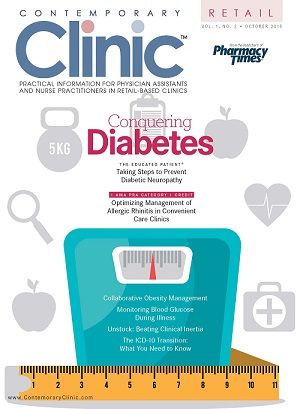From the Editor: Retail Clinics Expand the Scope of Patient Care

Since the passage of the Affordable Care Act, more Americans are insured than ever before, and therefore, wait times for primary care physicians, who have been dwindling in numbers, are gradually increasing. The American public generally thinks of retail-based clinics as an alternative place to visit for an acute illness when their primary physician is unavailable. Due to the rising cost of health care with higher deductibles, however, patients are more cognizant of where their dollars are going and are becoming better-informed consumers of health care. With the mandate that Americans must have coverage, more people are turning to retail clinics, not only for acute care, such as sore throats and minor illnesses, but preventive and wellness services, as well, including screenings for diabetes. Although management of chronic conditions is relatively new in the retail health space, the nurse practitioners and physician assistants who staff these clinics are already treating these conditions, and for that reason, we’ve dedicated this issue specifically to diabetes.
Articles in this issue provide valuable content for retail-based clinicians on preventing diabetes through weight-management and healthy-lifestyle programs and pearls for treating patients previously diagnosed with diabetes who present to the clinic with acute illnesses. Counseling advice for clinicians is provided through articles on addressing clinical inertia, important drug—drug interactions that may occur between diabetes medications and other drugs or supplements, and follow-up care for patients with diabetes. The Educated Patient section, which serves to provide information for patients in plain language, includes information the health provider can use when talking with patients about diabetic neuropathy and how to avoid and treat it.
As the retail health industry continues to play an important role in population health and provide accessible, affordable, high-quality health care to millions each year,Contemporary Clinicis a trusted resource to further and support those efforts.
Tine Hansen-Turton, MGA, JD, FCPP, FAANserves as the founding executive director for the Convenient Care Association (CCA), the national trade association for the over 2,000 private-sector retail clinics industry, which serves millions of people with basic health care services across the country, and has been coined by Harvard professor Clayton Christensen as a “disruptive health innovation.” She assists CCA with business and programmatic strategy, development, coordination and implementation, as well as with policy development and state and national advocacy.

